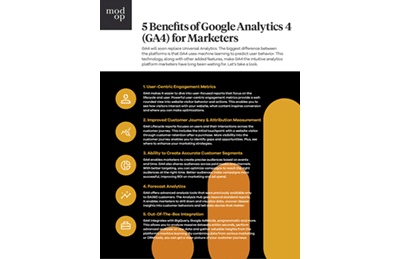Part 1: Shift To The Future With Machine Learning
Murtaza (Matz) Lukmani
Product Lead at Google

On July 1, 2023, Google Universal Analytics (UA) will stop processing new website data. That’s due to the introduction of Google Analytics 4 (GA4), a next-generation analytics tool powered by machine learning.
What do marketers need to know about GA4? How does it track data differently? What role does it play in the martech stack? What is Google Performance Max? What’s common between Google Analytics 4 and Performance Max?
Matz Lukmani, Product Lead at Google, answers questions about GA4 and Performance Max. He also shares how these tools can help marketers improve overall measurement, strategy and performance.
In Part 1, Matz focuses more on GA4. Listen to Part 2 to hear all about Performance Max.
This episode of the Leader Generation Podcast hosted by Tessa Burg, Chief Technology Officer at Mod Op.
Highlights From This Episode:
- Overview of Google Analytics 4
- Google Analytics 4 privacy changes
- Features built on machine learning
- Benefits of GA4 for marketers
- How GA4 tracks data differently
- Setting up UA and GA4 side-by-side
- The role of GA4 in the marketing tech stack
- Differences between free and paid versions of GA4
Watch the Live Recording
Tessa Burg: Hello and welcome to another episode of Leader Generation brought to you by Mod Op. I’m your host Tessa Burg, CTO at Mod Op. And today I’m joined by Matz Lukmani. He’s the product lead at Google and we’re really excited to dive into shifting to the future with machine learning. I know a lot of marketers might be either intimidated or don’t know exactly what the benefits of machine learning are but, our conversation is going to dive deep into how Google Analytics 4 helps you measure more accurately and using Performance Max helps you better improve your targeting and overall performance within Google Ads itself. So Matz, thanks so much for joining us. We’re excited to have this conversation today.
Matz Lukmani: Thank you. Thank you for having me Tessa.
Tessa Burg: So tell us first a little bit about yourself. How long have you been at Google? What kind of roles have you had there while, while working there?
Matz Lukmani: Sure. So maybe just to kick us off, hello everyone. My name is Murtaza, if you can get the word right. I’ve been at Google for around eight years and I actually started in our engineering teams and product teams back in New York and now I work out of our Europe offices here in London and I managed the Europe Middle East and Africa market leading product rollouts. I’m a product lead on analytics and another product we’ll talk about, Performance Max.
Tessa Burg: And something I learned about you that I think is interesting is you are a New York Jets fan.
Matz Lukmani: That is true.
Tessa Burg: So, I, I think that you, you’re not based in the United States. So how did that come to be? How did you become a Jets fan?
Matz Lukmani: Yeah, I, I get to explain that to every American friend of mine. So, I went to school in Jersey that was my grad school and have a lot of happy memories going to Jets games and is watching American football have hence sidegraded to cricket here in UK. So, I do watch Cricket more often than watching my, my fun team Jets, but I’m hearing they’re doing not too bad these days. So, it’s a, it’s a fun watch and I do turn on the television and watch my favorite Jets team fight it out on the field.
Tessa Burg: Yeah, I thought about you during the Browns opener when they beat us by one stinking point but it’s painful being a Cleveland Browns fan. It always will be. Maybe I should switch to cricket too.
Tessa Burg: So, let’s talk a little bit about Google Analytics 4. Tell us what do you think marketers need to know as they begin to use this as their new measurement tool?
Matz Lukmani: Great question. There’s a lot to unpack there. As, as I mentioned, I’ve been at Google eight years but I feel felt like never really left Google Analytics as a product. I started there in a, in a capacity. I’m still working very closely with that team. If you think about it, Google Analytics is even older. Urchin was the real product, the analytics platform Google acquired back in 2005 and if you think of your phone imagine you’re still using your phone that you bought in the year 2005, 15 years back. If you try to go into Instagram and all the other fun channels we have out there imagine trying to use that phone, what 15 years back for the content of today.
Matz Lukmani: We haven’t done a major platform upgrade on Google Analytics for a long time and this is one of our major, major platform upgrades from the old version of Universal Analytics to the new version. We call it Google Analytics 4, really the version number there. There are a few things that are really critical for advertisers to know.
Matz Lukmani: The first thing being GA4 or Google Analytics 4 is really privacy first. With all the changes that have happened in the ecosystem from ITP and ETPs, some of these browser changes that and updates that limited what you could track on a Safari or a Firefox browser, even things like Chrome as it’s improving its standards on what we could measure and could not measure under a third or a first party cookie. A lot of this data loss is essentially modeled against on a GFO platform. So, if you have a GFO setup, it’s, it’s more future proof. It’s it’s using modeling where it’s losing out on any data segments. Universal Analytics does not benefit from these modeling improvements made on the new product.
Matz Lukmani: And then there are other things, you know. We are launching new AI features. The essence of this podcast is to talk about machine learning and we bring the best of Google’s machine learning in Google Analytics 4. So, think about features like predictive audiences where we try to look at your data in your account and predict probability of conversion, probability of profitable conversions, probability of churn of a user that’s coming to your site and try to allow you to build matrices on these AI built predictive elements.
Matz Lukmani: And then once these metrics are there in your reports so you get more used to them, you can use it for media optimization so you can build audiences on top of them and market to them, and all of this is free. So that’s the other big element. And the final thing I’ll kind of throw in there is user journeys have changed. Think about 15 years back, how much of your time did you spend on a mobile phone versus desktop. And now, so there’s a big cross-device, cross-platform user engagement for your users out there and Google Analytics 4 is built on that foundation to allow you to go and look at cross device, cross platform analytics better from ground up.
Tessa Burg: It’s funny that you opened up by saying, you know, Google Analytics has been around for 15 years like it, so much has happened and when Google Analytics came into popularity we were still putting those little badges on our website that said hits like your hit counter and that’s what you’re most interested in. And now you know, the new model being based around events. I think one question marketers have is I love that it’s privacy first, but you know does that mean cookies are going away and how does something become more accurate if we aren’t using cookies to, on our website to kind of capture data?
Matz Lukmani: Yeah, we’ll, we’ll try and solve all of those problems in in in Google Analytics 4. I’m just kidding, that’s not gonna happen but … We’ll try, we’ll try and improve on what we have.
Matz Lukmani: So, you’ll always have, you have a new data model as you mentioned with Google Analytics 4, right, so it’s a it’s an event space data model. It looks at users and tries to measure the performance of users and gives you analytics at a user and event level versus what you had in the path which was hits, essentially hits to your site and then sessions that you would build on top of those hits. You still can bring those, you know, matrices NGA 4 so you can build out a comparative to what you had as session which was a time expiration of a user on a site. So, you can get to those elements, but ground up we’ve tried to build a better, newer data model and this aligns better with the cross-platform experience we are trying to build.
Matz Lukmani: So, the idea of a user using a mobile device to get your site or your properties versus web. The differences in tracking will always remain to a certain degree. I think any platform migration has that or even if you have two platforms essentially measuring somewhat the same events can show slightly different numbers and you know, making sense of them is at times difficult. What you need to, I guess, focus more on is what are the settings of these platforms? So, when you go from the old to the new are you migrating the right settings over? If you had a certain look back window for your users are you keeping the sort same look back window? If you’re using a certain attribution model, are you still using that? And then as you compare it with other platforms, you go and take that same journey, you know, if there’s a slight difference between numbers is it at least trending in the same direction? As long as that’s in place, you should feel comfortable about migrating ’cause the idea is it’s a new data model. It tracks things differently, it benefits from cross-device and better modeling. So, the numbers will inherently be slightly different but is the new reality, new number more acceptable for your business stakeholders? And once you feel comfortable with that hopefully you can can start making decisions with that data.
Tessa Burg: Yeah, I, I love what you said about, you know, trying to make those decisions. Are you bringing the right metrics over? And I think, you know, a lot of if I put on like my client hat and think about some of our large clients, they really depend on Google Analytics and looking at that year-over-year data and a lot of us have spent time trying to get it as accurate as possible so that we can make decisions off of that. I know that when you’re moving to this new platform and it’s structured differently, do, like, what are you saying to clients about the data that they’re importing there or what’s the connect, how much data do they have to bring over or even can they bring over from traditional Google Analytics into GA4?
Matz Lukmani: Yeah, so transitions are very difficult, whether it’s analytics platform or if you’re just shifting gears and going from a slow lane to your fast lane on a freeway. So that’s always something you want to do it casual, not very casually but with a lot of intent behind it.
Matz Lukmani: With Google Analytics 4, our approach, at least for this year and even to the most extend last year as well since 2019, was to allow advertisers to have kind of a dual set up strategy. So rather than finding a point in time where you cut the, cut the line and you say, I, I go from the old platform to the new platform, we understand that transition is not ideal and we never want our clients to go that route.
Matz Lukmani: Instead, our plan was to give enough time for clients to set up both the old Universal Analytics and the new GA4 side-by-side. You don’t need an extra tag, you can use your existing Google analytics tag. The same tag captures the data and you can send the data to two separate plat, platforms. There might be some minor modification of the tag that you might have to do if you’re sitting on a really old version of Universal Analytics tags. But with that in place you can start sending data to two platforms and the plan was this year you start measuring the activities that matter for your business in both the platforms, the Universal Analytics and GA4. Start comparing the numbers, start feeling comfortable with the differences. Start setting up some of the key features you need so if there are certain events you’re tracking or audiences you’re building, set them up correctly on GA4 and as we get into next year we aim to sunset the old product.
Matz Lukmani: So, you’ll, you’ll still have your historic data in Universal Analytics, you can access it but a point in time we’ll stop processing new hits on the old product and only process new hits in the GA4 products. So, you’ll have some history of both the platforms together, ideally this year and, and a part of last year and a little bit of next year. And then at some point in time you’ll only have new data in the GFO product. We’re hoping with this strategy people have enough time to get used to the new platform make the most out of it and get to a point where they don’t use the old product anymore, so it it becomes the source of their you know, analytics, actions, et cetera.
Tessa Burg: Yeah, I, I love that strategy. Set them both up, let them run in parallel. I think an important call-out for anyone who’s listening is that date when Google Analytics steps processing is July, 2023. And you said something else that I think is so important which is what are the right things to measure? So, if you’re looking at your Google Analytics platform, you can, but with a fresh eyes, what data do you want to get out of it? And maybe you’re measuring year-over-year differently ’cause GA4 has predictive powers built in. And, you know, sometimes I think we get very stuck in but this is how we’ve been measuring year-over-year right now. But this is an opportunity for that refresh to say well what objective am I really trying to accomplish and what do I need to know to get to that endpoint? Does it really have to be I have to keep tracking the actual number of visitors that came to my site, or is it better that GA4 is gonna give you more metrics, more context around the quality of those visitors? I think that this new platform and new model is an opportunity for GA4 to play a different role in the business. But what do you think the role of Google Analytics 4 should be? We have clients with multiple platforms like they have CRM Marketing Automation and is that different for your paying versus non-paying customers?
Matz Lukmani: Got it, got it. So I, I think critical element is with GA4 or Google Analytics 4, we’ve looked at the features which help marketers make better decisions on better user experiences being, being built, better marketing dollars being spent and we’ve just made them mainstream by keeping it free. For enterprise customers with more sophisticated needs, we have the GA360 offering and it’s the same for GA4 as it was in Universal Analytics in a way. There are a few pillars of the 360 offering. So it’s better scale, so you get things like API usage, which is high up, big query export limits, which are even high up. You get features like reporting history and you can build more audiences and conversion types and track them. Also, on the reporting site you get better features like custom tables that have a higher commonality limit that lesser timeouts, et cetera. So, it gives you better scale.
Matz Lukmani: The second bit is data governance. So, if you’re an enterprise customer you wanna probably create a more structured approach of tracking your multiple properties using things like sub-property and roll-up property. You may want to use some of our user management features to control who gets access to what. And then the final element is support and security. So, you get better, you actually get SLAs on the GA360 platform. Get audit notifications and compliance features as well. So, there’s a lot of enterprise quality features you get by signing up for a 360 account versus a free account but a free account can get you started very quickly. One footnote I would put out there is any integrations to Google Ads, Search Ads 360, Display and Video 360 platforms, these integrations are now free. So, if you are using GA4, you can still just start with integrating and making, you know, making and driving actions on the data you’ve collected from day one, versus in the past they were they were 360 only, they were paid features. So that’s a bit of a bonus now.
Tessa Burg: Ah, that’s great. If people wanted to reach out to you, ask questions how could they get in touch with you after listening to this podcast?
Matz Lukmani: Cool. So first of all, if you’ve reached to the end of this podcast thank you – for listening through, so love, love that. If you want more, please find me on LinkedIn. I’m on LinkedIn so you can always ping me and I would love to have a conversation, love a nice conversation. And then secondly, I would actually just mention we have a very hardworking and awesome Google Account teams out there. So if you have an account manager, whether they helped you with Google Ads or Analytics, or you have a partner that you work with an agency that’s trained by Google on Google products, please reach out to them. They’ll, they’ll know so much about your business and they know they’re trained by Google folks as well, so they, they know our products very well. Work with them to improve your performance. They would love to hear more and personally, yeah, please find me on LinkedIn. I’m right there. I’d be happy to have a chat.
Tessa Burg: Well thank you Matz so much for being our guest today and for all the listeners that made it to the end, you can hear more Leader Generation podcasts by visiting our LinkedIn Showcase Page just search Leader Generation. You can find me on LinkedIn, it’s Tessa dash Burg, or or visit Mod Op. So best of luck to everyone who’s getting ready to make this big transition. Feel free to reach out if you need help and we will talk to you later. Thank you Matz.
Matz Lukmani: Thank you.
Murtaza (Matz) Lukmani
Product Lead at Google

Matz Lukmani (EMEA Product Lead, Performance Max & Attribution) based in London (UK) has been with google for +7 years working on products like Google Analytics 360, Google Ads, Search Ads 360 and Firebase Analytics. He currently leads Performance Max Campaigns and Attribution offerings within Google Ads, Search Ads 360 and Google Analytics in EMEA.
GA4 Information Sheet


